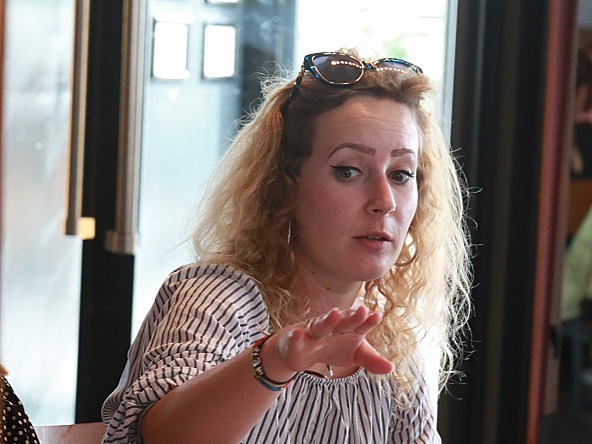Q&A: How an internship scheme led to CrowdDNA dropping CVs

When did you decide to drop CVs at interview stage and why?
It all started with our Culture Club paid internship programme. The idea of it was to break the mould of internships. It was designed to encourage people from different backgrounds. When I started in market research, everyone was getting into the industry because they knew someone already in it.
So, we started looking at how to bring people in who have no idea the industry exists and don’t necessarily have a background in doing research. It was just an application form – we didn’t ask where they live, where they come from, etc, we asked: ‘tell us about culture, tell us about you and then ask us questions’. I manage the programme so I’d then contact them for an initial call, which would be the first time I’d make contact with the person.
It was a massive success in terms of the skill level and diversity we were getting in. We heard stories from people coming from all around the world and what made them interested in culture… it diversified the team from a junior level upwards very quickly.
They fed back that not having to submit a CV took away the formality and the feeling of wondering: whether their CV was good enough; if they had included too much or too little information; or whether, if they don’t have the exact experience, that is going to be held against them. Hearing that feedback, we thought that we could make it a bigger project.
Obviously, for certain roles, especially on the senior side, there is an element of a need for experience, because otherwise it’s just not going to work. People don’t have to submit a CV but they can reach out if they want a networking chat to find out more about what we do. Some people do send in CVs and LinkedIn profiles, but it’s never something we ask for. I get a lot of direct emails and have a lot of conversations and networking calls without seeing CVs. Most of the people I have hired, I have no idea what their CV looks like to this day.
People have transferable skills, but they don’t necessarily need to have done something like for like, so it removes the need for having a CV that shows you’ve worked for eight competitors. It’s about allowing them space, and having a dynamic where I’m learning as much about you as you are about me at the same time. It allows you to hear about someone’s journey from their point of view. Written words can be misconstrued. Everyone in recruitment has been guilty at some point of seeing a CV and asking why a person has jumped jobs a lot, for example.
You can’t really get a sense of people being genuinely interested and passionate about what we do from a CV. Allowing an open forum changes the dynamic and people come to the interviews a little bit calmer. In the calls I have, I’m not asking them about something on their CV from five years ago, I’m just asking them to talk about themselves.
Have you experienced any challenges with this approach?
When everything is written down, you see a job ad with a salary level and a job description, and back in the day it might have been stipulating that people had worked in the industry for five years: people know what they are asking for. Sometimes we get people that are really passionate and interested in everything, which is great but they’re not 100% sure what they want and sometimes when you’re talking about a few opportunities, you can end up talking about different things and it gets a little bit off-tangent.
You’re telling people that ultimately these are the types of opportunities we have, this is the kind of package that we offer, we do pay transparency, we do salary bands, but you sometimes get people that expect more than this – whereas if there is a job ad, you can reference that directly.
So, we have had a few people say that they were expecting something different from a role, but I try to be honest and transparent in my conversations. There’s no point in trying to sell someone a dream or make the agency feel like something it isn’t. There’s never really been any negativity around it but you I just sometimes have to manage expectations.
What’s the response been like from candidates?
My inbox is quite busy. As part of the Strat7 group, we also have a group talent acquisition manager. If we don’t have roles available as an agency, I usually offer to introduce people to her. Most people ask for a networking call with me, and we do tend to keep in touch with them.
What is the key benefit of getting rid of CVs?
I have a better idea of a person when I can take that person at face value. If you’ve got 20 CVs in front of you, you’re expecting fireworks after you’ve read ‘I’m an enthusiastic worker’ 12 times. You’re trying to pull out what you can. A lot of the time, when people email me, they’re speaking to me as opposed to writing a generic CV which they could have sent to eight people. You meet them for the first time on that call and they have no idea what to expect, I have no idea what to expect. You start on a more equal playing field.
People that wouldn’t have responded because they don’t like the formalities or they’re worried – it removes all of that. The diversification of talent has been mad. It’s opening the doors that previously would have been closed to people and I think that’s important.
Does this approach take longer?
It depends on the role and brand positioning. Some companies are very committed to what they are asking for, such as requiring five years’ experience. Some companies also don’t have the resource to be able to accommodate chats, even if they only take 15 minutes. If you don’t have the resource, it can be time-consuming. Also with some businesses, there are expectations, and certain roles people may potentially struggle in because the expectations aren’t clear.
Of course, for the more senior roles there’s an expectation of skillset and experience required. I can get that information during my conversations with people, but it can take more time – not always.
What’s the reaction been from colleagues within CrowdDNA? Do people feel that this approach helps them find the people they need for their teams?
To start you will always have some cynicism for anything that’s new. I do think there was a historic stigma that to interview you needed a CV. We were then saying: ‘We don’t have a CV, we have a name, and here are the notes I’ve taken from my chat’, and people need to have blind faith that you know what you’re talking about.
But once success kicked in, everyone was on board, because I think everyone wanted to make the environment inclusive. There was an element of nervousness – what if they don’t have the right experience, what if it takes longer, what if we don’t get any applicants? But that can be the same for any role – you can have a job posted in five locations and it doesn’t mean that you’ll get any applicants or that you’ll have a turnaround time of two weeks. Recruitment can fluctuate and vary so much.
Dropping CVs has worked quite well for us and we’re proud of it. We’ve also done some EDI work: a toolkit for managers on how to be inclusive when they’re interviewing, for example. If you’re so used to having CVs, how do you structure your interview when you don’t, what kind of questions can you ask? We’ve done training on pronouns, such as not assuming gender from a name in an email.
The team are invaluable. Having people that have different ways of looking at culture in ways that you wouldn’t think about if you only had three people that had all worked at Flamingo, for example. Now instead, we’ve got people reflecting on their own experiences, and people are responding and saying: ‘That’s a different way of looking at it.’ That’s what it’s allowed us to do.
This interview has been lightly edited for clarity

We hope you enjoyed this article.
Research Live is published by MRS.
The Market Research Society (MRS) exists to promote and protect the research sector, showcasing how research delivers impact for businesses and government.
Members of MRS enjoy many benefits including tailoured policy guidance, discounts on training and conferences, and access to member-only content.
For example, there's an archive of winning case studies from over a decade of MRS Awards.
Find out more about the benefits of joining MRS here.














0 Comments